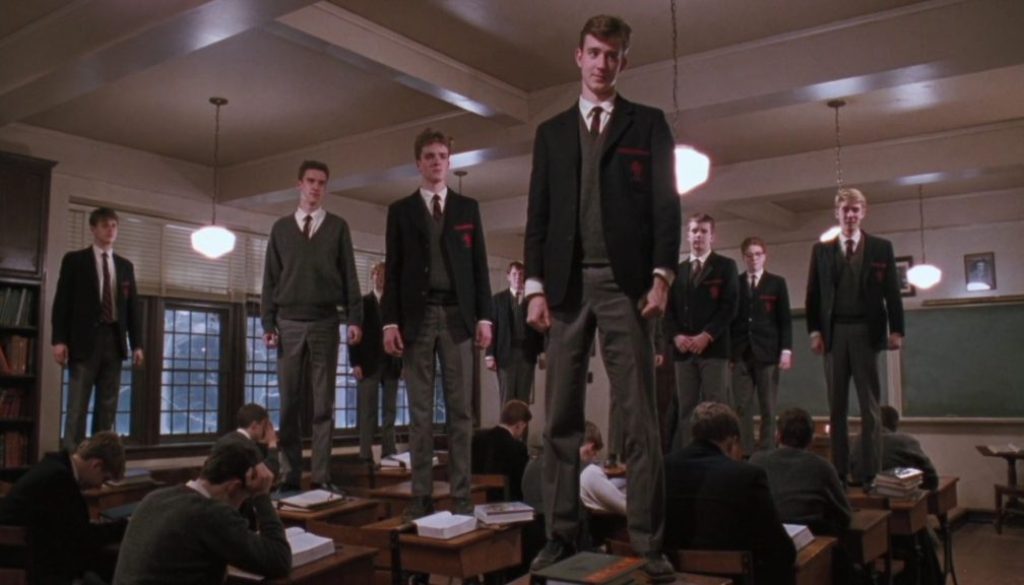Movie Review: Communication in Dead Poets Society

Last week, as I mined the archives, I continued to find older deposits. Some are of pretty low-grade ore. The following sample was written for The University of San Francisco Business Journal in 1995.
By John D. Breen – San Francisco, CA
October 11, 1995
Communication is to human interrelations as breathing is to life: not the sole requirement, but one without which the function could not occur. Communication can take many forms, among them the verbal, visual, written, or the silent.
Furthermore, while in a given situation one form may be more effective than another, each may induce adverse consequences when inappropriately applied. If people unite to answer a particular purpose, their interaction must be effectual.
Great swaths of Canadian forest have been felled to produce the paper on which has been written lessons and tales of poor communication. Likewise, movies have proliferated in which improper communication caused misfortune or tragedy.
Peter Weir directed such a film six years ago. Starring Robin Williams as an unorthodox English teacher, Dead Poets Society is the story of boys at a New England boarding school known for its adherence to tradition and discipline. Williams, in the role of Professor John Keating, contradicts the traditional emphasis on discipline by imploring his students to carpe diem, seize the day.
The appeal is greeted with considerable skepticism by boys so accustomed to an environment where regulations are paramount. Soon, however, the initial trepidation wanes, and the boys begin to seize more from the day than Professor Keating intended.
Opposed to Keating are an inflexible faculty and an unyielding father of one of the boys. The resistance of these factions to Keating is initially covert and cautious, but grows overt and insistent as the boys become more independent and rebellious. Engendered are circumstances under which Mr. Keating is relieved of his duties, one boy is expelled, one a suicide, and many others indignant. Poor communication played no small part in this deteriorating situation.
The film contains communication that is both effective and ineffective, though examples of the latter far outnumber those of the former. Indeed, instances of effective communication are notably sparse. The preponderance of communication transmitted by the school to the boys is effective only to a degree, as is that of Mr. Keating and of Mr. Perry, father of Neil Perry, the aforementioned suicide.
Rules, regulations, and strict codes of conduct are conveyed by way of an authoritarian administration that tolerates no deviation from them. The boys without doubt receive and comprehend the message and the implications of defying it. That they surreptitiously create and perpetuate their new Dead Poets Society only reinforces this conclusion; however, it also indicates that the message lacks the persuasive force it craves. Moreover, the cultural communication implicit in such symbols as the banners hoisted at the outset of the film is received only superficially by the boys. The “four pillars” are dutifully repeated in the chapel, only later to be mocked in the dorm.
Similarly, Neil Perry understands his father’s expectations so well that he attempts to avoid being caught ignoring them. Early in the film, Neil is ordered by his father to withdraw from his extracurricular activities. After initially being scolded for his resistance, Neil sheepishly succumbs to his father’s commands.
Communicated to Neil by his father in this scene are two points: his father will not accommodate Neil’s desires, not will he even give ear to them. Conspicuously absent in the communication channel linking Neil with Mr. Perry is the willingness of the latter to listen. Painfully aware of this truth, Neil employs alternate tactics after earning the lead in a play for which he secretly auditioned.
Misinterpreting the teaching of Mr. Keating, Neil decides to defy his father and participate without his knowledge. Naturally, Neil is discovered by his furious father. Although he was wonderful in the play, he is driven home without the slightest commendation, or any words at all, from his father. Once home, he is informed that he will live his life according to his father’s intent, without regard to his own.
This series of events occasioned the most potent of all messages sent by Neil to his father. Resigned to the fact that his father is impervious to communication, Neil resolved to send a signal that leaves little room for misinterpretation. He pressed a revolver to his temple, and blasted himself to eternity. While this extreme measure may or may not have achieved its purpose with his father, it did discharge Neil from the obligation to keep trying.
The message Neil sent his father was also received by the school. In an attempt to absolve themselves, the administration imputed blame for the tragedy to Mr. Keating and his unconventional approach to teaching. Consequently, he was relieved of his position at the school.
Intimidation and coercion compelled students to corroborate this verdict. These severe actions were to serve as communication to the parents and alumni that the school as indeed in control of itself. Although the communication was effective in this regard, its authoritarian tone and dictatorial style were particularly ineffective in persuading the students. They reluctantly accepted the message not because it was effective per se, but because it was backed by a credible threat of force.
Ample examples of ineffectual communication notwithstanding, the film’s most effective and poignant message was delivered at it culmination. By standing on their desks and expressing solidarity with Mr. Keating, the boys sent a signal both to him and the school. Evidence of the effectiveness of this message is supplied by the reactions of its recipients. Mr. Keating responds with heartfelt gratitude as the chancellor erupts in outrage.
Poor communication is a virus that infects organizations and individuals in innumerable environments. Among the remedies is an understanding of the reasoning, sympathies, and proclivities of those with whom interactions occur.
Empathy and knowledge of the audience are not optional components of effective communication. Dead Poets Society is replete with examples of such neglect. Neil is not understood by his father, the message of Mr. Keating is misinterpreted by his students, and the school is unresponsive to the concerns of either. All parties suffer, some tragically.
As life imitates art, and vice versa, the implications of ineffective communication are ignored at the peril of those who choose to do so.
– JD



